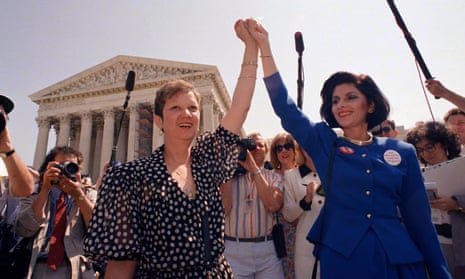Norma McCorvey, who was just 22 years old when she became better known as Jane Roe in the landmark 1973 supreme court case Roe v Wade, has died aged 69 in her home state of Texas.
Her death was confirmed by the journalist Joshua Prager, who was working on a book about McCorvey and was with her and her family when she died. He told the Associated Press that she died of heart failure at an assisted living center in Katy, Texas.
Pregnant and unmarried in 1969, McCorvey sought to terminate a pregnancy, setting off a long struggle through the courts that culminated in a legal ruling that would become, and remains, a touchstone for a bitter culture war over reproductive rights.
When McCorvey brought the action, under the pseudonym Jane Roe, in 1970, she was simply looking for the right to end a pregnancy she did not wish to bring to term. Three years later, the supreme court handed down its historic 7-to-2 ruling, establishing the constitutional right to terminate a pregnancy. By the time the ruling was delivered, McCorvey’s baby was two and a half years old and had been given up for adoption. She later claimed that she had been misled by her lawyers, who, she said, used her as a “patsy” to bring about abortion rights.
McCorvey later became a figurehead for both sides of the issue. Initially, she was celebrated by pro-choice campaigners and reviled by anti-abortion activists, and campaigned in the 1980s in support of abortion clinics.
But McCorvey abruptly converted to evangelical Christianity and was baptized in a swimming pool, in front of network TV cameras, by the minister who headed the group Operation Rescue. McCorvey became a fierce opponent of abortion rights, and remained so through her conversion to Catholicism. .
“I’m 100% pro-life,” she told the Associated Press in 1998. “I don’t believe in abortion even in an extreme situation. If the woman is impregnated by a rapist, it’s still a child. You’re not to act as your own God.”
She described herself as the victim of her lawyers, who she claimed used her case to win a larger abortion rights cause. “She felt used by Sarah Weddington [her attorney] and she felt a sense of responsibility that her signature led to the slaughter of millions of children,” said Janet Morana, the executive director of Priests for Life and a longtime friend of McCorvey’s.

McCorvey was involved in a handful of legal challenges to Roe over the years, but the bulk of her activism was with religious groups opposed to Roe.
“Norma found out about Roe v Wade passing by opening her door one morning and seeing the newspaper,” Morana said. “Norma never had an abortion. She gave birth to the Roe baby.”
After her conversion, Morana said, “she used to say, ‘I am Roe no more.’ That was very important to her, that people would understand that she was no longer Roe. She, just yesterday, when I talked to her, she wanted to tell everyone to continue the fight. I take that as a personal mission.”
In 2009, McCorvey was twice arrested for protesting: on one occasion against a speech by Barack Obama, and on a second at the supreme court nomination hearing of Sonia Sotomayor. McCorvey stopped speaking publicly over the past three years, and in the past year or two her declining health prevented her from attending anti-abortion events.
But her life was never truly settled. She wrote in her autobiography, I Am Roe, that she was a victim of abuse during her childhood in Louisiana and Texas, that she stole money at the age of 10 from a gas station, and that she later struggled with drug and alcohol abuse. Early in her life, she had been enrolled in a Catholic boarding school and at a reform school for delinquents, and she worked, variously, as a bartender, a maid and a house painter. Her mother told her biographer, Prager, that she’d beaten her daughter over her “wild” behavior.
“She loved life. She loved people. She wanted to make a Texan out of me,” Morana said. “She took me shopping for cowboy boots and hats.”
“I don’t require that much in my life,” McCorvey told the New York Times in 1994. “I just never had the privilege to go into an abortion clinic, lay down and have an abortion. That’s the only thing I never had.”
The Associated Press contributed reporting
